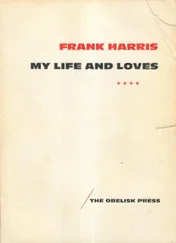Frank Harris - My life and loves Vol. 2
Здесь есть возможность читать онлайн «Frank Harris - My life and loves Vol. 2» весь текст электронной книги совершенно бесплатно (целиком полную версию без сокращений). В некоторых случаях можно слушать аудио, скачать через торрент в формате fb2 и присутствует краткое содержание. Жанр: Эротика, Секс, на английском языке. Описание произведения, (предисловие) а так же отзывы посетителей доступны на портале библиотеки ЛибКат.
- Название:My life and loves Vol. 2
- Автор:
- Жанр:
- Год:неизвестен
- ISBN:нет данных
- Рейтинг книги:4 / 5. Голосов: 1
-
Избранное:Добавить в избранное
- Отзывы:
-
Ваша оценка:
- 80
- 1
- 2
- 3
- 4
- 5
My life and loves Vol. 2: краткое содержание, описание и аннотация
Предлагаем к чтению аннотацию, описание, краткое содержание или предисловие (зависит от того, что написал сам автор книги «My life and loves Vol. 2»). Если вы не нашли необходимую информацию о книге — напишите в комментариях, мы постараемся отыскать её.
My life and loves Vol. 2 — читать онлайн бесплатно полную книгу (весь текст) целиком
Ниже представлен текст книги, разбитый по страницам. Система сохранения места последней прочитанной страницы, позволяет с удобством читать онлайн бесплатно книгу «My life and loves Vol. 2», без необходимости каждый раз заново искать на чём Вы остановились. Поставьте закладку, и сможете в любой момент перейти на страницу, на которой закончили чтение.
Интервал:
Закладка:
"It was through a kneeling crowd that we took our hero to the Slaviansky Bazaar and laid him on his bed. And the piety of the Russian people is such, its admiration of greatness so profound, that the story has never got out or been in print. Do you wonder that some of us always think of our fatherland as Holy Russia?"
As I listened to this story, the great words of Blake came into my mind, the final word for all of us mortals:
And throughout all Eternity
I forgive you, you forgive me:
As our dear Redeemer said
This is the wine and this is the bread.
CHAPTER II
Why I went to Heidelberg and not to Berlin to study I can't say; there was a touch of romance in the name which probably drew me. I had over fifteen hundred pounds in the bank and thought it would keep me five years and allow me to return to the States to begin my life's work with at least a thousand pounds in my pocket. But was I going back to America? I had to confess to myself that the malarial fever in the States daunted me; besides I liked England better and so put off any decision. Already the proverb influenced me: not to cross a river till you come to it.
Heidelberg fascinated me; I loved its beauty, the great forest-clad hills about it, its river, its ruined castle, its plain, business-like university, its Cafe Leer, its bookshops-everything. I went to the Hotel de l'Europe for a week and found it expensive; but the Rhine wines are delicious and not dear: the Marcobrunner and Liebfraumilch of ten years of age taught me what scent and flavour wine could possess.
On the river I got to know a couple of young Americans, Treadwell by name, with whom I soon struck up a friendship. I had gone to the riverside hoping to get a boat for a row: a stalwart young fellow was just paying for his canoe.
"Kann ich?" I hesitated, pointing to his skiff, "Ja wohl!" was the loud genial answer. "But you're an Englishman?" he added in English. "American rather,"
I replied, and my acquaintance soon confided to me that he and his younger brother had been brought up in a German school and that he was studying chemistry and was already an assistant of the celebrated Professor Bunsen, the man who first discovered the chemical composition of the stars and the inventor of the spectroscope. Here were wonders! I was on fire to learn more, to meet Bunsen. "Could I?" "Surely!" I thrilled.
This elder Treadwell was a personable fellow, perhaps five feet nine in height and evidently vigorous, clean-shaven, with strong features and alert expression; but I soon discovered that in spite of his knowledge of quantitative and qualitative analysis, he was not intellectual in my understanding of the word. His younger brother, who had just entered the university to continue the study of philology, pleased me more. He was about my own size and learned already in Latin and Greek, German and French; thoughtful, too, with indwelling grey eyes. "A fine mind," I concluded,
"though immature," and we soon became friends. Through him I went to live in a pension where he and his brother boarded and where my living cost me less than a pound a week. The living was excellent because the pension was kept by a large motherly Englishwoman, widow of a German professor, who was a maitresse jemme of the wisest and kindliest.
There I met a Mr. Onions who had won all sorts of honours in Oxford and who soon became a sort of pal, for he, too, loved literature as I did and seemed to me inconceivably clever; for he wrote brilliant Latin and Greek verses and in three months had mastered German, though he didn't speak it well. Onions confessed that he studied German three of four hours every morning, so I did the same and gave three or four more hours to it every afternoon. One day he astonished and pleased me by saying that I must have a genius for languages, for my German was already better than his. At any rate I spoke it more fluently; for I talked it whenever I got the opportunity while he was rather silent.
Naturally young Tread well introduced me to the university; I took all his lectures and worked night and day to the limiting of sleep and exercise. In three months I spoke German fluently and correctly and had read Lessing, Schiller, Heine's Lieder, and all the ordinary novels, especially Soil und Haben.
But I had not won much from the university lectures. I had heard one set of lectures on the Greek verb; but after two months the professor was still enmeshed in Sanskrit, and as I did not know a word of Sanskrit or its significance, I found it difficult to follow him. I was indeed continually reminded of Heine's experience. He had been hearing lectures on universal history, he tells us, but after three years' assiduous attendance he gave them up, for the professor had not yet reached the time of Sesostris.
Kuno Fischerff was at this time perhaps the most popular professor in Heidelberg: he had announced a series of lectures on Shakespeare and Goethe and the aula was crammed not only by students, but by ladies and gentlemen from the town. Fischer had a face like a bulldog's and his nose had been split in a duel, which increased the likeness; he began by calling Shakespeare and Goethe the twin flowers of the Germanic race; I was still English enough to think the phrase almost a blasphemy, so I rubbed my feet loudly on the floor as a sign of disapproval or disagreement (ich scharrte).
Fischer paused in utter surprise (it was the first tune, he told me afterwards, that he had ever been so interrupted): then, putting a manifest constraint on himself, he said: "If the gentleman who disagrees with me so emphatically will wait till I have finished, I will ask him to state the ground of his disapproval." There was applause throughout the audience at this and the men who were in my neighbourhood glared at me in angry surprise.
Fischer went on to say that "the very name of Shakespeare showed his Teutonic ancestry; he was as German as Goethe."
I smiled to myself, but I could not deny that the rest of the lecture was interesting, though the professor hardly attempted to realize either man. At the end he contrasted their schooling and congratulated his hearers on the fact that Goethe had enjoyed far superior educational opportunities and had turned them to brilliant account. The audience applauded enthusiastically as he sat down. Fischer, however, rose again immediately and holding out his hand for silence added: "If the critic who made his disagreement at the beginning of my lecture so manifest now desires to explain, I'm sure we will hear him willingly."
I got up and stammered a little, as if embarrassed, while asking the audience and the professor to excuse my faulty German. But as a Welsh Celt, I said,
"What I feel is that the eloquent Professor is over praising the Teutons and especially their superior education. Superior!" I repeated; "Shakespeare has given us the drama of first love in Romeo and Juliet and of mature passion in Antony and Cleopatra, of jealousy in Othello, the malady of thought in Hamlet and madness in Lear; and against these Goethe has given Faust alone as a proof of his 'superior' advantages!
"But 'Shake' and 'speare' are Teuton, we are told. Now English is an amalgam of low German and of French; but curiously enough, all the higher words are French and only the poor monosyllables are Teuton; for example, mutton is French while "sheep" or "schaf" is pure German. I had always imagined," I added after a pause, "that 'Shakespeare' was plainly taken from the French and was a manifest corruption of 'Jacques Pierre'"-at this the audience began to titter and Fischer, entering into the joke, clapped his hands, smiling.
Naturally, my effect achieved, I sat down at once.
As I was leaving the hall Fischer's servant came and told me the professor would like to see me in his room; of course I followed him at once and Fischer met me laughing. "Ein genialer Stretch! A genial invention," he said, "and no worse than many of our etymologies," and then seriously, "You made an admirable defence of Shakespeare, though I think Goethe has a good deal more to his credit than Faust."
Читать дальшеИнтервал:
Закладка:
Похожие книги на «My life and loves Vol. 2»
Представляем Вашему вниманию похожие книги на «My life and loves Vol. 2» списком для выбора. Мы отобрали схожую по названию и смыслу литературу в надежде предоставить читателям больше вариантов отыскать новые, интересные, ещё непрочитанные произведения.
Обсуждение, отзывы о книге «My life and loves Vol. 2» и просто собственные мнения читателей. Оставьте ваши комментарии, напишите, что Вы думаете о произведении, его смысле или главных героях. Укажите что конкретно понравилось, а что нет, и почему Вы так считаете.






![William Frith - John Leech, His Life and Work. Vol. 1 [of 2]](/books/747171/william-frith-john-leech-his-life-and-work-vol-thumb.webp)
![William Frith - John Leech, His Life and Work, Vol. 2 [of 2]](/books/748201/william-frith-john-leech-his-life-and-work-vol-thumb.webp)




